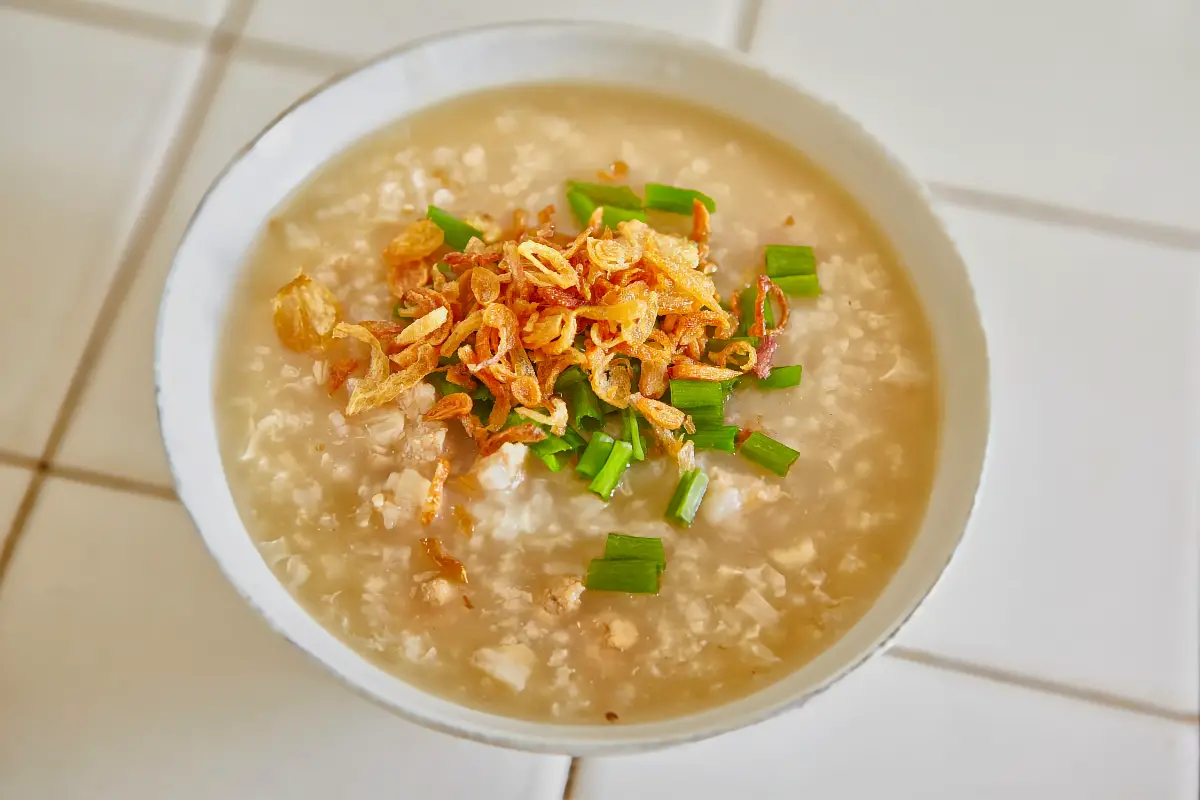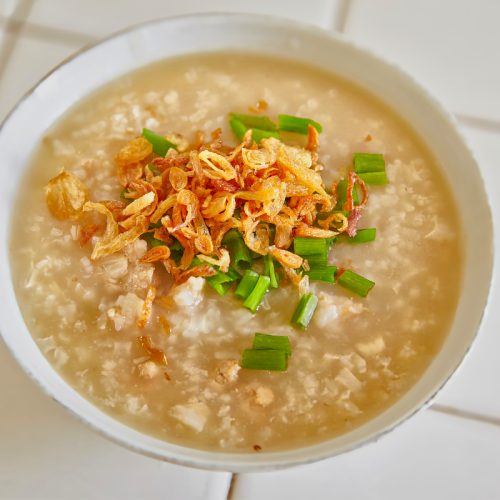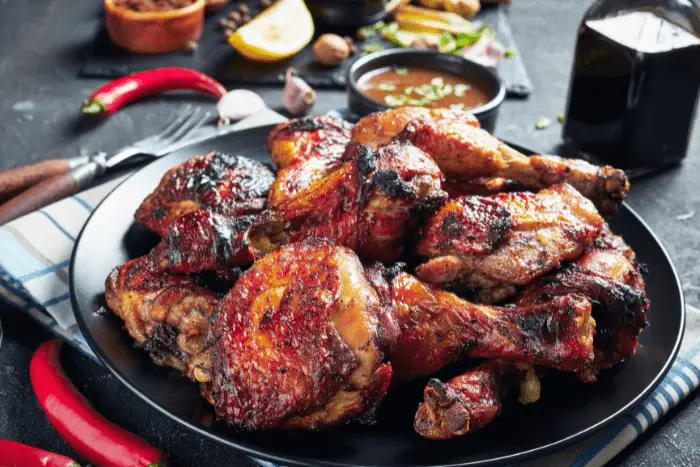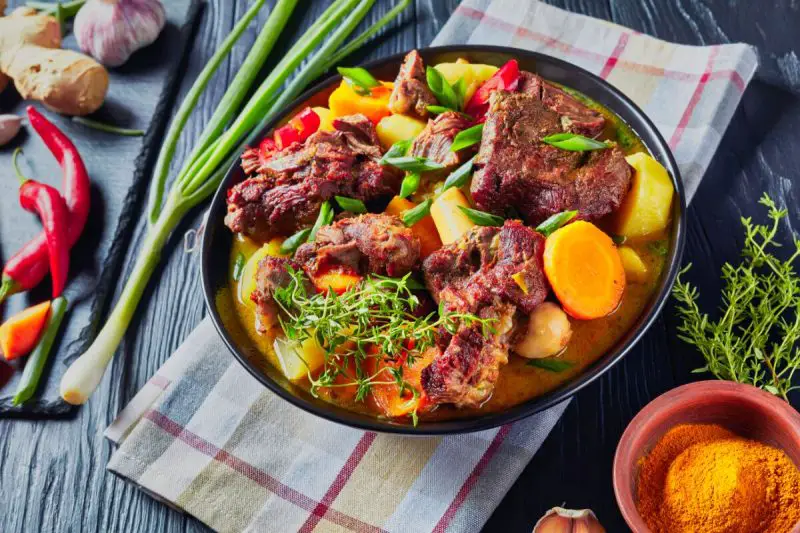
The Haitian Mayi Moulen Recipe, for Haitian cornmeal porridge, is a popular breakfast dish throughout the country. Cornmeal is cooked with water, milk, and spices until it thickens into a porridge-like consistency in this classic Haitian cuisine. Mayi Moulen is a popular morning food that goes well with eggs, sausage, and bacon, among other things.
Want more ideas to round-out your Haitian Recipe Box?
A lot of great options are in these posts!
This Haitian Mayi Moulen Recipe is steeped in tradition and is an integral part of Haitian heritage. The recipe for Mayi Moulen is said to have been passed down through the generations of Haitian cooks for hundreds of years. It is a traditional meal for celebrations and festivals including Christmas, Easter, and the Haitian Revolution.
You May Want to Join The World Recipes With Our Big Escape
Share your own recipes in our Facebook Group. Find recipes from all over the world. Learn more about International Cuisine and how you can surprise your family with new and exciting foods from all over the world.
For More Photos Visit Our Instagram at World Recipes Daily
The typical Haitian cooking utensils for a Haitian Mayi Moulen Recipe are a wooden spoon and a clay pot. The clay pot is said to effectively transmit heat, leading to a creamy and smooth consistency, while the wooden spoon is thought to impart a unique flavor to the meal.
The Haitian Mayi Moulen Recipe is made by cooking cornmeal with water, milk, and spices including cinnamon, nutmeg, and vanilla essence. The porridge is cooked by constantly stirring the ingredients with a wooden spoon over medium heat until it thickens. After a few minutes, the porridge can be served at room temperature.
There are many ways to appreciate Haitian Mayi Moulen. Some like to sweeten it with sugar, honey, or fruit, while other individuals like it unsweetened. It goes well with salty meats like bacon or sausage.
Haitian Mayi Moulen has been a staple of Haitian cuisine for decades. It has great cultural significance for the Haitian people and is traditionally prepared and served on holidays and other joyous occasions. Mayi Moulen is a popular dish in Haitian cuisine since it is simple to make and can be eaten in many different ways.
3 Reasons People Love the Haitian Mayi Moulen Recipe
1. Comforting and Filling: The Haitian Mayi Moulen recipe from Haiti is popular because it is both hearty and soothing. This meal is ideal for a cold morning because of its thick and creamy consistency, similar to that of porridge. The cornmeal in the dish is an excellent source of carbs, which aids in satiety and keeps you feeling full for longer. It’s a great breakfast alternative since it can be tailored to individual preferences by adding sugar, honey, or fruit.
2. Rich Cultural Heritage: The recipe for Haitian Mayi Moulen is beloved by many also because of its rich cultural and historical significance in Haiti. This dish has been a mainstay in many Haitian families for generations. Two essential elements of Haitian cooking, the wooden spoon and the clay pot, come together in this recipe. It is also a staple for celebrations and festivals crucial to Haitian identity, such as Christmas and Haitian Independence Day.
3. Simple and Easy to Prepare: The Haitian Mayi Moulen dish is a fan favorite as well, and for good reason. The meal can be prepared in less than 30 minutes using just a handful of common kitchen staples. The recipe’s simplicity also makes it suitable for novices and veterans alike. It’s a flexible and tasty alternative for any mealtime, and it can be altered to suit different tastes with the addition of other spices or accompaniments.

How To Make Our Haitian Mayi Moulen Recipe
Ingredients: (8 servings)
2 cups of cornmeal
4 cups of water
1 cup coconut milk
1 small onion, finely chopped
2 cloves garlic, minced
1/2 cup bell pepper (red, green, or mixed), chopped
1/4 cup fresh parsley, chopped
1/4 cup fresh chives, chopped
1/4 cup fresh cilantro, chopped
2 tablespoons vegetable oil
1 teaspoon salt
1/2 teaspoon black pepper
1/2 teaspoon ground thyme (optional)
Hot sauce or pikliz (Haitian pickled vegetable condiment), for serving (optional)
Instructions:
1. In a large pot or deep skillet, heat the vegetable oil over medium heat.
2. Add the onions, garlic, and bell pepper. Sauté for about 3-4 minutes until the onions become translucent and the bell pepper is tender.
3. Add the chopped parsley, chives, and cilantro to the pot. Stir to combine.
4. Pour in the water and coconut milk. Add salt, black pepper, and ground thyme (if using). Bring to a boil.
5. Gradually add the cornmeal to the boiling liquid, whisking constantly to prevent lumps from forming.
6. Lower the heat to a simmer, and cover the pot. Cook for 25-30 minutes, stirring occasionally to prevent the cornmeal from sticking to the bottom.
7. Once the cornmeal has absorbed all the liquid and has reached a thick, porridge-like consistency, remove from heat.
8. Allow the mayi moulen to rest for 5 minutes, then fluff with a fork.
9. Serve hot, with hot sauce or pikliz on the side if desired.
Nutritional Information For the Mayi Moulen Recipe:
Calories: 240
Carbohydrates: 34g
Protein: 4g
Fat: 10g
Saturated Fat: 4g
Cholesterol: 0mg
Sodium: 320mg
Potassium: 218mg
Fiber: 4g
Sugar: 2g
Prep Time: 15 minutes
Cooking Time: 30 minutes
Pots, Pans, and Cooking Equipment Needed for the Haitian Mayi Moulen Recipe
Large pot or deep skillet with a lid
Whisk or wooden spoon
Measuring cups and spoons
Knife and cutting board
Best Way to Store Leftovers For the Haitian Mayi Moulen Recipe
Store leftovers in an airtight container in the refrigerator for up to 3-4 days. To reheat, add a little water or coconut milk to the mayi moulen and heat on the stovetop over low heat, stirring occasionally, until warmed through.
Possible Substitutions For the Haitian Mayi Moulen Recipe
If you don’t have fresh herbs, you can use dried herbs. Use 1/3 of the amount of fresh herbs.
For a dairy-free option, replace coconut milk with water or almond milk.
If you don’t have cornmeal, you can use polenta or grits.
Vegetarian Version:
Ingredients to Substitute for a Vegetarian Version of the Haitian Mayi Moulen Recipe
None required, the recipe is already vegetarian
Tips and Tricks for Easier Creation
Pre-chop all the vegetables and herbs before you start cooking.
Whisk cornmeal into the boiling liquid gradually to avoid lumps.
Stir the Mayi Moulen occasionally while cooking to prevent it from sticking to the pot.
Possible Side Dishes and Desserts to Serve With the Haitian Mayi Moulen Recipe
Side dishes: Haitian-style beans and rice, steamed vegetables, or fried plantains.
Desserts: Haitian pineapple upside-down cake, sweet potato bread, or coconut flan.
How to Serve the Haitian Mayi Moulen Recipe
Scoop the mayi moulen onto plates or into bowls.
If desired, serve with hot sauce or pikliz on the side.
Accompany the Haitian Mayi Moulen recipe with your choice of side dishes and a dessert.
5 FAQs About the Haitian Mayi Moulen Recipe
1. What is Haitian Mayi Moulen?
Haitian Mayi Moulen is a traditional Haitian dish made from cornmeal cooked with water, coconut milk, and various herbs and vegetables. It has a thick, porridge-like consistency and is typically served as a main course or side dish in Haitian cuisine.
2. Can I make Mayi Moulen without coconut milk?
Yes, you can make Mayi Moulen without coconut milk by replacing it with water or another non-dairy milk such as almond milk. However, coconut milk adds a rich flavor and creaminess to the dish, so using a substitute may alter the taste and texture.
3. What is the difference between Mayi Moulen and Polenta?
Mayi Moulen and Polenta are similar dishes made from cornmeal, but they have different flavor profiles and cooking methods. Mayi Moulen is a Haitian dish that uses coconut milk, herbs, and vegetables for added flavor, while Polenta is an Italian dish typically cooked with water or broth and seasoned with butter, cheese, or herbs. Polenta is often served as a creamy side dish or cooled and sliced, while Mayi Moulen is usually served as a main course with additional accompaniments.
4. Is Haitian Mayi Moulen gluten-free?
Yes, Haitian Mayi Moulen is gluten-free, as it is made with cornmeal, which is naturally gluten-free. However, always check the labels of any additional ingredients, such as seasonings or sauces, to ensure they are gluten-free as well.
5. Can I make Mayi Moulen ahead of time?
You can make Mayi Moulen ahead of time, but it is best when served fresh. If you need to prepare it in advance, cook the dish as directed and then store it in an airtight container in the refrigerator for up to a day. To reheat, add a little water or coconut milk to the Mayi Moulen and heat on the stovetop over low heat, stirring occasionally, until warmed through.
Final Thoughts:
The Mayi Moulen recipe, a typical Haitian meal, is a delicious example of the Caribbean country’s rich taste palette and culinary history. Mayi Moulen started out as a simple staple cuisine, but it has since developed into a multipurpose and tasty dish that can be served as either a main course or a side dish. Coconut milk, veggies, and herbs mix to create a rich and creamy dish with a thick, porridge-like consistency that is both filling and delicious.
The cornmeal that makes up the bulk of the Mayi Moulen recipe has been used as a staple in Caribbean and South American cooking for generations due to its gluten-free and nutrient-rich nature. The dish’s sturdy texture and flavor are both supported by the cornmeal, which also acts as a base for the other components’ bold characteristics.
The Mayi Moulen recipe gets its trademark creaminess and a tinge of sweetness from the addition of coconut milk. This item is not only tasty, but also beneficial to your health because it contains beneficial nutrients including healthy fats and vitamins. You may use water or almond milk instead of coconut milk if you’re lactose intolerant or just want to switch things up a bit.
Mayi Moulen captures the spirit of Haitian cooking with its blend of fresh herbs like parsley, chives, and cilantro, and a variety of aromatic vegetables including onion, garlic, and bell pepper. They provide a new dimension to the dish’s taste while also providing healthy nutrients and antioxidants.
The Mayi Moulen’s recipe versatility is only one of its many advantages. It’s simple to alter the recipe to fit your dietary needs, or to play around with different flavors by using alternative components. Cornmeal may be replaced with polenta or grits, dried herbs can be used in place of fresh ones, and nutritious greens like spinach and kale can be thrown in for good measure.
Paying great attention throughout cooking is essential for a tasty Mayi Moulen. To avoid lumps, add the cornmeal to the boiling liquid gradually while whisking frequently. The cornmeal won’t cling to the bottom of the pan and the flavors will blend better if you stir it occasionally as it cooks.
Mayi Moulen may be taken to new heights when served with traditional Haitian condiments like hot sauce or pikliz, which offer a delicious contrast in flavor and texture. Haitian-style beans and rice, steamed veggies, or fried plantains are excellent complements, and the dinner may be rounded up with a sweet treat like pineapple upside-down cake, sweet potato bread, or coconut flan.
In conclusion, Haitian Mayi Moulen recipe is a delectable and adaptable meal that exemplifies Haiti’s diverse culinary heritage. Cornmeal, coconut milk, veggies, and herbs come together to produce a harmonious blend of tastes that appeals to a wide variety of palates. Mayi Moulen is a great meal for both inexperienced and seasoned chefs due to its versatility and straightforward preparation. Try out this delicious dish from Haiti and add some Caribbean flavor to your next meal.
Haitian Mayi Moulen
Equipment
- Large pot or deep skillet with a lid
- Whisk or wooden spoon
- Measuring cups and spoons
- Knife and cutting board
Ingredients
- 2 cups cornmeal
- 4 cups water
- 1 cup coconut milk
- 1 small onion, finely chopped
- 2 cloves garlic, minced
- 1/2 cup bell pepper (red, green, or mixed), chopped
- 1/4 cup fresh parsley, chopped
- 1/4 cup fresh chives, chopped
- 1/4 cup fresh cilantro, chopped
- 2 tbsp vegetable oil
- 1 tsp salt
- 1/2 tsp black pepper
- 1/2 tsp thyme
- Hot sauce or pikliz (Haitian pickled vegetable condiment), for serving (optional)
Instructions
- Hot sauce or pikliz (Haitian pickled vegetable condiment), for serving (optional)
- Add the onions, garlic, and bell pepper. Sauté for about 3-4 minutes until the onions become translucent and the bell pepper is tender.
- Add the chopped parsley, chives, and cilantro to the pot. Stir to combine.
- Pour in the water and coconut milk. Add salt, black pepper, and ground thyme (if using). Bring to a boil.
- Gradually add the cornmeal to the boiling liquid, whisking constantly to prevent lumps from forming.
- Lower the heat to a simmer, and cover the pot. Cook for 25-30 minutes, stirring occasionally to prevent the cornmeal from sticking to the bottom.
- Once the cornmeal has absorbed all the liquid and has reached a thick, porridge-like consistency, remove from heat.
- Allow the Mayi Moulen to rest for 5 minutes, then fluff with a fork.
- Serve hot, with hot sauce or pikliz on the side if desired.


